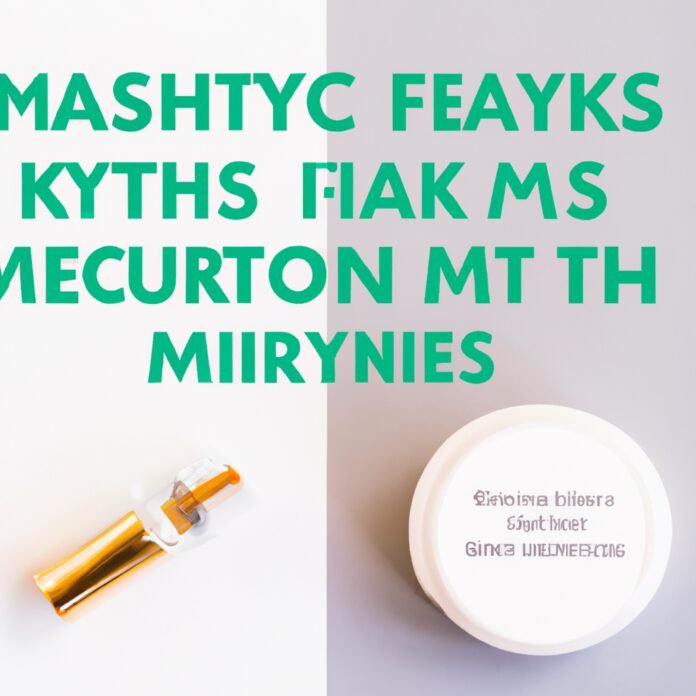We all want to have a healthy and glowing complexion, but there are so many different skincare practices on the market that it can be hard to decipher fact from fiction. To sort out the myths from the facts and make sure you’re taking the best possible care of your skin, it’s time to get straight to the facts—and debunk some of the age-old common skincare misconceptions.
1. Skin-spiration: Myths and Facts
When it comes to taking care of your skin, there are likely a few myths that come to mind. It’s important to learn the difference between fact and fiction, in order to make sure you’re doing the best you can for your skin.
- Myth: Tanning beds will give you a healthy glow
Fact: Tanning beds can be incredibly damaging to your skin. Not only do they increase your chances of skin cancer, they also increase signs of premature aging. So, it’s better to opt for a self-tanning cream that will give you a sunless glow this summer. - Myth: Acne is caused by poor hygiene
Fact: While good hygiene is key for your skin, this is actually a false belief. Acne is caused by overactive oil glands, as well as hormonal changes. Healthy habits, such as washing your face regularly, can help reduce the severity of breakouts, but it won’t necessarily prevent them. - Myth: Moisturizing is unnecessary when you have oily skin
Fact: Even if you are prone to oiliness, moisturizing is still incredibly important. Your skin still needs hydration and nourishment, so investing in a lightweight, oil-free formula is essential for a healthy glow.
It can be easy to fall into believing the various skin care myths that are out there. To make sure you’re on the right track with your own skin care routine, make sure to do your research and consider consulting with a dermatologist. It’s also worth considering to invest in quality skin care products that are designed to work with your individual skin type, as this can make a huge difference in the overall health of your skin. With these tips in mind, you can make sure you’re taking amazing care of your skin!
2. Don’t Believe Everything You Hear: Debunking Skincare Misconceptions
With the abundance of information online about skincare, it can be difficult to know what is true and what is not. Unfortunately, that means it’s also easy for misinformation to spread, leaving people with misconceptions about what’s best for their skin. Here are the top five skincare myths debunked:
- Your moisturizer has to be expensive to work: This is not true. While expensive products may contain newer, more advanced ingredients, a good quality, affordable skin-care product can do wonders for your skin. Price isn’t always an indicator of efficacy.
- You don’t need sunscreen when you’re indoors: Although you may not be exposed to direct sunlight, you could still be absorbing harmful UV rays from a nearby window reflection or other sources. That’s why it’s important to wear sunscreen whenever you’re outside, and even when you’re inside, especially if you plan to be near a window for long periods of time.
- Oily skin doesn’t need moisturizer: Oily skin still needs to be moisturized! Moisturizer helps to balance out your skin’s natural oils and protect against dehydration. Use an oil-free moisturizer that won’t clog your pores.
Skincare myths can be daunting. But by debunking these common misconceptions, you can hone in on the right products and practices for your skin. Don’t let misinformation stop you from keeping your skin healthy and happy.
And remember – don’t believe everything you read online, even if it seems like everyone is saying it! Take the time to do your own research, read labels carefully and speak to a dermatologist about your individual needs.
3. Separating Reality from Fiction: Exposing Skincare Fallacies
When it comes to skincare, it’s tough to separate fact from fiction. It’s an industry riddled with myths we hear all the time, with no end in sight. But understanding what’s true and what’s false is important. To be an educated consumer, it helps to have a basic understanding of the facts behind skincare criticism.
Here are three common skincare fallacies to keep on your radar:
- Overnight Transformations: You can’t solve your skin concerns with one magical treatment. It’s important to remember that getting your skin in its best shape takes time and consistent practice, not one magical session.
- Expiring Skincare: The shelf life of skincare products varies, but they don’t all become immediately unusable after a certain amount of time. Be wary of false expiration dates set by the manufacturer and use your own judgement along with basic hygiene principles to decide whether or not you should still use items that are beyond the set expiration date.
- Cheap is as Good as Expensive: It may be tempting to go for the cheaper option at the pharmacy, but in terms of quality, they’re not always the same. Often pricier items contain better ingredients, or are made with more advanced technology. It pays to research what goes into a product before pressing the “buy” button.
Be sure to thoroughly research any product you plan to use on your skin. Knowing the truth behind the myths can help you make smarter skincare decisions and get your skin glowing the way you want it to.
Skincare trends may change, but understanding the underlying facts is an important exercise that can help inform your decisions. Eventually, you’ll be able to separate fact from fiction and make the right skincare choices for you.
4. Illuminating the Truth: Exploring the Science Behind Skincare
In this age of skincare technology, it can seem difficult to discern truth from hype. But the truth is that, behind all the marketing and product claims, there is solid science at work. By understanding and taking advantage of advances in the field of skin science, you can make the most effective and safe choices for your skincare needs.
Choosing the Right Ingredients Oftentimes, choosing the right skincare product can be overwhelming. From collagen to ceramides, the wealth of ingredients might seem intimidating. Fortunately, there is a wealth of scientific evidence to guide you. For example, the use of antioxidants, compounds that inhibit the oxidation of other molecules, may ward off future signs of aging. Hyaluronic acid, an ingredient found in many moisturizers, is able to attract up to 1000 times its weight in water. Selecting these and other effective ingredients can help ensure maximum skincare results.
Comprehending Product Claims As you select a skincare product, sorting through the claims presented can become a chore. Claims such as “all-natural” or “beyond organic” are often difficult to decipher. An important tip is to recognize the distinction between marketing and science. Investing in the research behind a product is a great way to determine its efficacy.
- Understanding the science behind skincare can help you make informed decisions.
- It’s important to sift through product claims to ensure that you’re investing in research-backed products.
- Selecting effective ingredients and doing additional research can yield the best skincare results.
The art and science of skincare can work together to achieve desired results. Understanding the science behind skincare is the key to unlocking the right product. With a little bit of research, you can confidently choose the right skincare products that will brighten and beautify your complexion and keep your skin looking healthy.
So now that you know the truth behind common skincare myths, you can determine which treatments will work best for you and your skin. No longer must you rely on unfounded advice and misinformation, but instead, draw from your knowledge and make the best decisions for your unique skin.


